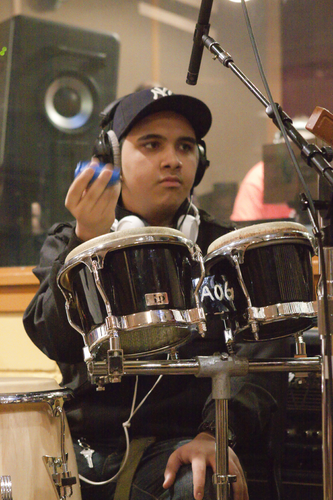Raul Midón: The Importance of Taking Charge

Raul Midón
Photo by Darry Madden

Music production and engineering chair Rob Jaczko (seated) and student engineer Andres Matias Algaba '12 work at the recording console.
Photo by Darry Madden

Student pianist Delvyn Brumfield and faculty bassist Winston Maccow
Photo by Darry Madden

Raul Midón demonstrates a groove he's striving for on "Was It Ever Really Love?"
Photo by Darry Madden

A student percussionist participates in the recording session.
Photo by Darry Madden
Singer-songwriter and guitarist Raul Midón and five other musicians—three Berklee faculty members and two students—had been laying down basic tracks for an hour in one of Berklee's recording studios. After starting and quickly stopping a few takes, Midón, who has been blind since infancy, suggested they take a break and listen. With about 20 people jammed around the recording console, Midón analyzed the drum part, explaining to Sean Skeete, assistant percussion chair, how he'd like the part to sound.
"I want it slick and clean," Midón said, after suggesting Skeete remove one kick after the first chorus. "Everybody should think parts, whatever you're playing, play it exactly the same way each time we come to that section. This is my version of pop music."
Although he couldn't see any of his bandmates, Midón took command and was able to communicate exactly what he needed from his sidemen. He was making sure his song, "Was It Ever Really Love?" would turn out the way he envisioned, but he was also providing a group of blind and visually impaired Berklee students witnessing the scene with an object lesson on how to overcome obstacles they are likely to face in their careers.
"I had talked to the kids about the importance of being a leader and creating your own situations," Midón said a few days later, speaking over the phone from his studio in Maryland. "The recording session was the implementation of everything I talked about to them. I was the leader. They were doing my song, and I knew what was going on."
The session was the culmination of two days the visiting artist had spent on campus, some of it with visually impaired students and some of it with songwriters. It began with a meeting between Midón, blind faculty member Chi Kim—who is director of Berklee's Program for Blind and Visually Impaired Musicians—and the student participants in the program.
"He had a positive impact on each of these students," said songwriting chair Jack Perricone. "But he did not in any way sugarcoat the difficulties that all musicians face, and the added difficulties he has encountered because of his blindness."
Some of the blind students performed in the recording session—including vocalists Natalia Sulca and Nyol Manswell—with plans to have guitarist Noe Socha and trumpeter Wayne Pearcy overdub solos later. The session was engineered by music production and engineering chair, Rob Jaczko, with assistance from two student engineers. Watch the video below to see how the session looked and sounded.
"There are certain things most people don't even think about that are obstacles a blind person needs to figure out," said Midón. "Stupid stuff, like how you get to gigs, how you get paid. One of the difficult things about being blind in any industry is how you make yourself valuable enough that nobody is going to give you business just because you're blind, or feel sorry for you."
In recent years, Berklee has enhanced its environment for enabling visually impaired students to get as much out of the curriculum as any student. Changes included hiring Kim and launching a new class, Assisted Music Technology for Visually Impaired Students. After learning about the program during his visit, Midon gave it positive reviews.
"The thing that is really impressive and great about what's going on at Berklee and what Chi is doing is that they're teaching them about technology and having them be conversant in technology. It's all about doing it yourself these days," Midón said.
Midón, who has released five albums as a leader and has performed or recorded with Shakira, Marcus Miller, Herbie Hancock, and Jason Mraz, among others, told students that he dragged a bulky Braille writer with him to sessions for 10 years. Advances in technology are helping, but it will still be up to blind musicians to be sufficiently persistent and creative to gain the independence they'll need to succeed.
"As blind people, we can't pump gas or wait tables. Almost anyone can do that for a while and make money while they play music. We don't, so we really have to get it together," Midón said. "With the technology, it opens up the world for blind musicians in other ways—to be producers, engineers, maybe not freelance engineers, but certainly in their own environment."
It also helps to know what one wants and be able to express it among other musicians, just as Midón did in the Berklee environment. He said he would return to campus to give students another dose of reality and practical lessons as they prepare to build careers of their own.
